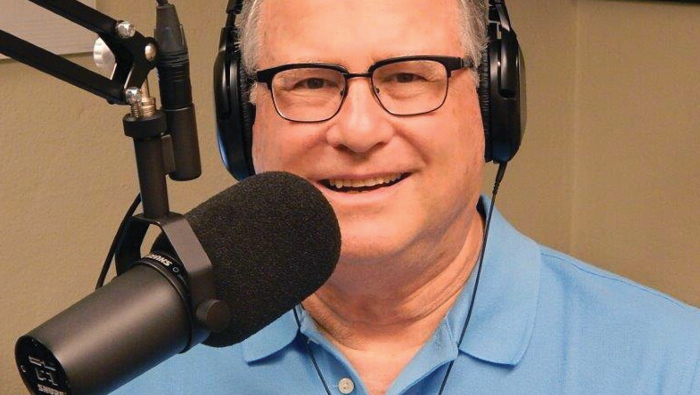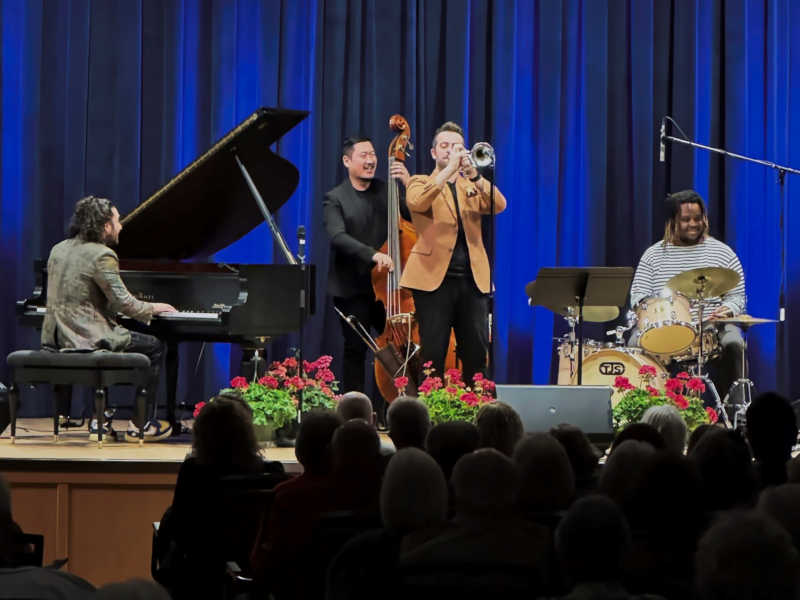By his own admission, Stu Turgel likes to talk – a lot. So what better place than his seat behind a mic in the downtown studios of Radio Phoenix, an internet-based music and talk radio station, inside Phoenix Center for the Arts?
Stu’s weekly newsmagazine, “The Phoenix File,” allows him to do just that as he engages guests in compelling conversations about the people and programs making a positive difference around the Valley. Most of his guests represent nonprofit organizations; his listeners are people “who are curious about what’s going well in our community versus who focus on what’s wrong in society,” says Stu.
Topics run the gamut from sensible election reform and responsible downtown development to recent shows featuring the Arizona Talking Book Library for those with visual or other physical challenges and a nonprofit called “Families Giving Back” that pairs families and their young children with local volunteering opportunities. The Phoenix File airs for 30 minutes every Tuesday evening at 6:30. And if you miss it live, his show is conveniently available for a listen at your leisure at thephoenixfile.net/podcasts.
When asked about the particular demographics of his listeners, Stu cites the difference between stations like Radio Phoenix and commercial stations, which have deeper pockets to track ratings through surveys and market research: “What we do know [at Radio Phoenix] is that we tend to provide content that isn’t available anywhere else. We reach audiences and markets that are typically not well-served by [commercial] broadcast media.
“My audience tends to be more educated, more enlightened, with a decided liberal bent – people who are generally socially responsible,” says Stu.
Accessibility of radio
With myriad ways today to engage and listen electronically – cell phones, computers, the internet, podcasts – Stu points out that radio is more relevant than ever.
“People want what they want, when they want it,” says Stu. “We have the ability to find very specific information from many different sources. We can all listen on our devices to any radio station we want” through streaming, the web and podcasts on demand. “I want to hear different perspectives, from different sources. Radio is so accessible.”
Stu discovered a love of radio at an early age. “Since I was a child, I’ve been hooked on talk radio,” he says. “I go to bed every night with headphones on.”
TuneIn, a free online radio service with access to thousands of stations around the country and around the world, allows Stu to listen to WBZ Boston to keep up with what’s going on in his hometown.
Stu’s varied and esteemed career began as a college disc jockey and newscaster for WCMO-FM at Marietta College in Ohio. He joined the Army during the Vietnam War and graduated from the military broadcast journalism program at the Department of Defense Information School in Indianapolis. He was news director for the Armed Forces Radio and Television Service on Johnston Island in the Pacific, broadcasting on both radio and TV.
Following his military service, entry-level healthcare PR jobs for national organizations under Jewish sponsorship set the course for his career. After decades of working in philanthropy, marketing communications, nonprofit management and communal service, Stu came to the Valley in 2006 to join the Jewish Community Foundation (JCF) of Greater Phoenix, where he worked tirelessly to strengthen local Jewish nonprofits. He retired from JCF as president in 2013 and joined Radio Phoenix in May 2016.
Lifelong love of communication
Stu likes to have about three months’ worth of shows booked in advance. “I’ll never run out of subject matter, because virtually every nonprofit organization has a story to tell,” he says. He also stresses that he is a volunteer at Radio Phoenix, along with 50 other volunteers who keep it going 24/7/365.
“I’m a one-man band: host and producer,” says Stu, who does the pre-production, editing, promotion and operation of the studio equipment for his show himself. He tells invited guests to “take a deep breath and relax. We ain’t ‘60 Minutes!’” He doesn’t blindside them with awkward questions and stresses that the show is not intended to be “cutting edge or controversial. I shine a light on people and programs that aren’t on the radar screen,” says Stu, adding that it’s totally unintentional that half of his guests have been members of the Jewish community with “causes that really deserve attention.”
Stu has enjoyed a lifelong love of communication. “There’s more to it than just listening – there’s talking,” he says. “My professional career has been about talking and communicating. Always talking. Sometimes it got me into trouble, but I always felt I had something to say and could say it reasonably well.”
“My mother always used to say that when they vaccinated me, it was with a phonograph needle,” says Stu with a laugh.
When Stu isn’t in the studio, he’s out bicycling or walking his beloved rescue pup, Emmie (his first dog). He and his life-partner Judy enjoy the theater and the symphony. They share a love of wine and Stu admits that they could “do sushi every night of the week.” His synagogue affiliation is Congregation Or Tzion in Scottsdale.
As a child, Stu enjoyed classic radio dramas like “The Shadow” from the 1930s. “You can still listen to those shows on the internet!” exclaims Stu. “Is radio still relevant? It sure is!”
Learn more at www.radiophoenix.org. Listen to Stu every Tuesday night at 6:30 pm or catch the show on your own time at thephoenixfile.net/podcasts.
Mary Ann Bashaw, of Phoenix, is an editor and writer.






